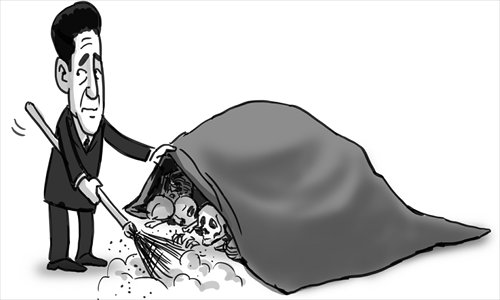Japanese WWII historical revisionism damages country’s future

Illustration: Liu Rui/GT
In recent days, there has been much speculation about what Japanese Prime Minister Shinzo Abe will say this summer in a statement marking the 70th anniversary of the end of WWII. Since Abe has claimed that he might not adhere to the Murayama statement in his own remarks, the strategies that Japan will take when dealing with its history in the future have become a hot issue to which the international community is paying close attention.
On the 50th anniversary of the end of WWII in August 1995, then prime minister Tomiichi Murayama issued a statement, frankly acknowledging that "colonial rule and aggression, caused tremendous damage and suffering to the people of many countries, particularly to those of Asian nations" and expressing his feelings of "deep remorse" and "heartfelt apology." The sincere attitude won understanding from Asian countries and made Japan an affluent state not only materially but also morally, even though the extent of such self-examination was a far cry from that of Germany.
But now, the rest of the world is worried that Abe may refuse to use words such as "colonial rule" and "aggression." Abe maintains that Japan's motive to start WWII was no different from that of other imperialist powers and he believes the capable and enlightened Japanese had the obligations to "emancipate" their suffering neighboring countries.
Abe's supporters claim that "comfort women" and the Nanjing Massacre are fabricated or exaggerated. The Yasukuni Shrine enshrines notorious class-A war criminals convicted by the International Military Tribunal for the Far East. They are worshipped by Abe's cabinet and members of Japan's National Diet while German Nazi war criminals convicted in the Nuremberg trials are disdained by people in every corner of the world.
It is those who attempt to celebrate Japanese "glories" during the imperialist era, not common Japanese people, that need the Yasukuni Shrine. A religious site should not enshrine cruel and bigoted war criminals.
Those criminals dragged Japan into a savage war which almost destroyed the country. But as the US dropped atomic bombs on Hiroshima and Nagasaki in 1945, Americans are perceived by the Japanese right to be the biggest inflictor of suffering on Japan during WWII.
Katsuya Okada, newly appointed leader of the Democratic Party of Japan, once said if Abe's new statement failed to reflect on Japan's past, it would probably deny all the country's development over the past 70 years. Abe's distorted view of history is severely eroding the respect Japan has gained as a pacifist country during the past seven decades. What's more important, Abe's words and deeds show that he wants to resurrect the prewar Japan that scorned its Asian neighbors instead of seeing clearly the dynamics of today's Asia.
The proactive pacifism proposed by Abe, though it can be accepted by countries in the region, can hardly garner credibility from the world at large including its close ally the US, if it lacks the courage to face its dark history of colonial rule and aggression. US President Barack Obama has revealed obvious his doubts about Abe, largely because of Abe's attitude toward history-related issues.
The Abe administration should send a correct signal on Japan's future role to the rest of the world, which will definitely bring positive effects to the choices of other countries. In East Asia, genuine "reconciliation" instead of dangerous "historical revisionism" is the most urgent task, to which Japan can become a respected contributor.
The author is a research fellow with the Charhar Institute and an adjunct fellow with the Center for International and Strategic Studies, Peking University. opinion@globaltimes.com.cn